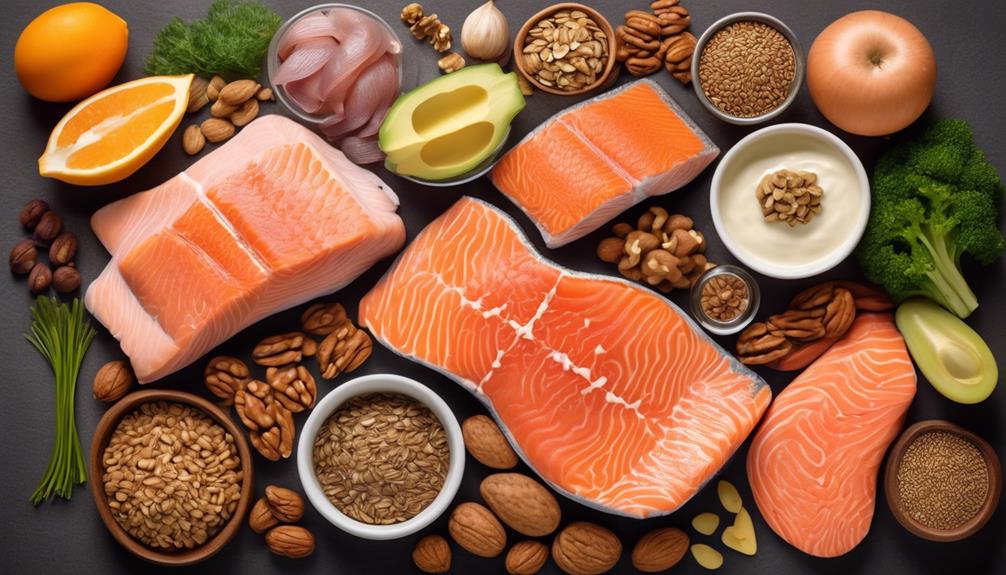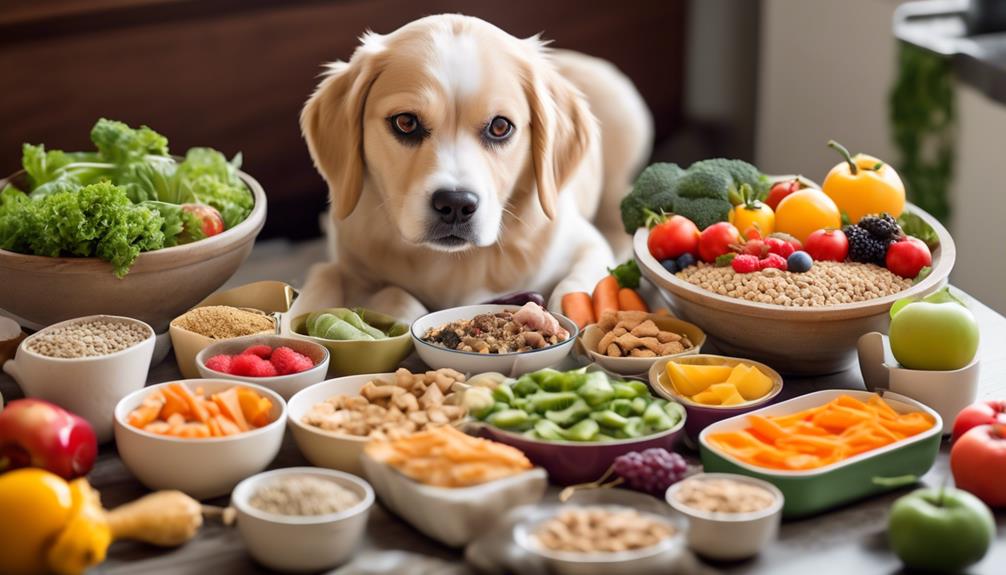Essential Nutritional Requirements for Pregnant Dogs
Pregnancy is a crucial time for your dog, and ensuring she receives the right nutrition is absolutely vital.
But do you really know what essential nutritional requirements your pregnant dog needs to stay healthy and support the growth of her puppies? Understanding the specific dietary needs during this time is essential to ensure the well-being of both your dog and her developing puppies.
From energy requirements to special considerations, there's a lot to consider when it comes to providing the best nutrition for your expecting dog.
Energy Requirements
You should carefully monitor your pregnant dog's energy requirements, ensuring she receives enough calories to support the growth and development of her puppies. During pregnancy, your dog's energy needs will increase, especially in the final third of gestation when the puppies experience the most rapid growth. To meet these increased energy requirements, you should gradually transition your dog to a high-quality, nutrient-dense commercial diet designed for pregnant and lactating dogs. This will help ensure that she receives the necessary nutrients and calories to support her own health as well as the growth of her puppies.
In addition to a proper diet, you should also consider your pregnant dog's exercise regimen. While regular exercise is important for overall health, it's crucial to tailor the intensity and duration of physical activity to your dog's individual needs during pregnancy. Moderate, low-impact exercise, such as short walks, is generally recommended to help manage weight and maintain muscle tone. However, it's important to consult with your veterinarian to develop an appropriate exercise plan for your pregnant dog, taking into consideration her breed, age, and overall health.
Weight management is another essential aspect of supporting your pregnant dog's energy requirements. While it's normal for pregnant dogs to gain weight, excessive weight gain can lead to complications during pregnancy and delivery. Monitoring her weight and adjusting her diet as needed can help prevent obesity and its associated health risks for both the mother and her puppies. Be sure to consult with your veterinarian to determine the appropriate weight gain and dietary adjustments for your pregnant dog.
Protein Needs
As your pregnant dog's energy requirements increase during the final third of gestation, her protein needs also become crucial for supporting the rapid growth and development of her puppies. Ensuring that your dog receives high-quality protein is essential for the healthy development of her growing litter.
Protein sources such as lean meats, eggs, and high-quality commercial dog foods are excellent choices to meet her heightened demands. These sources provide essential amino acids necessary for the development of the puppies' muscles, organs, and tissues.
Protein digestion is also vital to consider. During pregnancy, your dog's digestive system may undergo changes, affecting how she processes protein. Ensuring that the protein she consumes is easily digestible can help maximize its benefits. High-quality dog foods often contain protein sources that are readily digestible, ensuring that your dog can efficiently absorb and utilize the nutrients.
In addition to the quantity of protein, the quality also plays a significant role in meeting your pregnant dog's needs. High-quality protein sources provide a balanced amino acid profile, supporting the overall health of your pregnant dog and the optimal development of her puppies.
Consulting with your veterinarian can help you determine the best protein sources and diet for your pregnant dog, ensuring that she receives the necessary nutrition to support a healthy pregnancy and the growth of her puppies.
Essential Fatty Acids

During pregnancy, pregnant dogs require essential fatty acids to support the healthy development of their puppies. Essential fatty acids, particularly Omega-3, play a crucial role in fetal development. Omega-3 benefits include aiding in the development of the puppies' nervous system and brain, as well as supporting healthy vision and cognitive function. As a responsible dog owner, it's important to ensure that your pregnant dog's diet includes adequate levels of Omega-3 fatty acids to promote the optimal growth and well-being of her puppies.
DHA (docosahexaenoic acid) is a specific type of Omega-3 fatty acid that's particularly important for brain development in puppies. It's essential for the growth and functional development of the brain, as well as the overall cognitive and behavioral function of the puppies. DHA sources such as fish oil, algae, and certain types of marine microorganisms can be included in the pregnant dog's diet to ensure an adequate supply of this vital nutrient.
When selecting a diet for your pregnant dog, look for high-quality commercial dog foods that are specifically formulated for pregnant and nursing dogs. These foods are often fortified with essential fatty acids, including Omega-3, to support the unique nutritional needs of pregnant dogs. Additionally, you can consult with your veterinarian to discuss the option of supplementing your dog's diet with DHA-rich sources to further support the healthy development of her puppies.
Mineral and Vitamin Needs
Meeting the mineral and vitamin needs of pregnant dogs is essential for ensuring the health and development of both the mother and her puppies. Providing the right amount of minerals and vitamins is crucial for the proper growth of the fetuses and the overall health of the mother. Here are some key points to consider:
- Calcium Supplementation: Calcium is vital for bone development in both the mother and the developing puppies. During pregnancy, the demand for calcium increases, and if the diet doesn't provide enough, the mother's body will start to take calcium from her own bones, potentially leading to health issues. It's important to provide a balanced and appropriate calcium supplement to ensure the mother and her puppies receive adequate levels for healthy development.
- Iron Rich Foods: Iron is essential for the production of hemoglobin, which carries oxygen to tissues and organs. Pregnant dogs require more iron to support the increased blood volume and the development of the fetuses. Including iron-rich foods such as lean meats, liver, and dark leafy greens in the diet can help meet these increased demands and prevent iron deficiency anemia, which can negatively impact the health of both the mother and her puppies.
Ensuring proper mineral and vitamin intake through a balanced diet and appropriate supplementation is crucial for the health and well-being of pregnant dogs and their offspring.
Water Intake
Ensuring adequate water intake is crucial for supporting the proper absorption and utilization of minerals and vitamins essential for the health and development of pregnant dogs and their offspring. Hydration management is especially critical during pregnancy, as water plays a fundamental role in nearly all bodily functions. Pregnant dogs require more water to support the development of the fetus, maintain amniotic fluid, and aid in the production of milk after giving birth. Proper water consumption also helps regulate body temperature, prevent constipation, and support the circulatory system.
During pregnancy, a dog's water intake may increase by 50% or more compared to her non-pregnant state. It's important to monitor your dog's water consumption and ensure that she's access to clean, fresh water at all times. Dehydration can lead to serious complications for both the mother and her puppies, such as reduced milk production, poor fetal development, and an increased risk of urinary tract infections. If you notice any signs of dehydration, such as sunken eyes, lethargy, or dry gums, consult your veterinarian immediately.
In addition to monitoring water intake, consider feeding your pregnant dog moisture-rich foods such as wet dog food or adding water to her kibble. This can help increase her overall water consumption and contribute to her overall hydration. By prioritizing hydration management and ensuring adequate water intake, you can help support the health and well-being of your pregnant dog and her developing puppies.
Quality of Diet
To ensure the optimal health of your pregnant dog and her developing puppies, prioritize a high-quality diet that meets her increased nutritional needs during this critical stage. The quality of the diet plays a crucial role in the overall well-being of your pregnant dog and the healthy development of her puppies. Here's what you need to consider:
- Nutrient Absorption: A high-quality diet ensures that the essential nutrients are in a form that can be easily absorbed by your dog's body. This is particularly important during pregnancy when the demand for nutrients is significantly higher. Look for diets with high-quality protein sources, such as meat or fish, and easily digestible carbohydrates like brown rice or sweet potatoes.
- Balanced Nutrition: A well-balanced diet is essential to support the overall health of your pregnant dog. This includes the right mix of proteins, fats, carbohydrates, vitamins, and minerals. Aim for commercial dog foods specifically formulated for pregnant or nursing dogs, as these are designed to provide the ideal balance of nutrients required during this stage.
- Quality Ingredients: Opt for diets that use high-quality ingredients and are free from artificial additives or fillers. This ensures that your dog is getting the best possible nutrition without unnecessary additives that could potentially be harmful. Look for natural preservatives like mixed tocopherols (a source of vitamin E) instead of artificial preservatives like BHA, BHT, or ethoxyquin.
Feeding Frequency

During your dog's pregnancy, it's important to adjust her feeding frequency to ensure she receives the necessary nutrients for her and her developing puppies. Meal timing plays a crucial role in meeting the increased nutritional demands during pregnancy.
As your dog's pregnancy progresses, consider increasing the frequency of her meals to smaller portions spread throughout the day. This can help prevent discomfort from a full stomach pressing on her expanding uterus and provide a steadier supply of nutrients for her and her growing puppies.
Portion control is another essential aspect of feeding frequency. Instead of feeding larger meals less frequently, opt for smaller, more frequent meals to prevent overloading her digestive system. This approach can also help manage any potential pregnancy-related issues such as morning sickness or reduced appetite.
Special Considerations
While adjusting feeding frequency and portion control is important during pregnancy, there are several special considerations to keep in mind for the health and well-being of your pregnant dog and her developing puppies.
- Exercise Regimen: It's crucial to maintain a healthy exercise routine for your pregnant dog. Regular, moderate exercise will help to prevent excessive weight gain, promote muscle tone, and support overall health. However, it's important to avoid strenuous activities or high-impact exercises, especially as the pregnancy progresses.
- Weight Gain: Keep an eye on your dog's weight throughout the pregnancy. While some weight gain is expected and necessary for the health of the puppies, excessive weight gain can lead to complications during birth. Monitor her body condition and consult with your veterinarian to ensure she's gaining weight at a healthy and steady pace.
- Behavioral Changes: During pregnancy, your dog may exhibit nesting behavior as she prepares for the arrival of her puppies. Provide a quiet, comfortable space where she can build a nest and rest. Keep an eye out for any significant behavioral changes and consult with your vet if you notice any concerning shifts in her demeanor.
Frequently Asked Questions
Can Pregnant Dogs Eat Raw Meat as Part of Their Diet?
Yes, pregnant dogs can eat raw meat as part of their diet. However, it's crucial to ensure raw meat safety by sourcing high-quality, fresh ingredients. Raw meat offers nutritional benefits, but consult your vet to ensure a balanced diet.
Is It Safe to Give Pregnant Dogs Supplements Like Prenatal Vitamins?
Yes, it's safe to give pregnant dogs supplements like prenatal vitamins. They can help meet dietary restrictions and ensure proper nutrient absorption. Always consult your vet to choose the right supplements for your dog's specific needs.
How Can I Ensure My Pregnant Dog Is Getting Enough Exercise While Also Meeting Her Nutritional Needs?
To ensure your pregnant dog is getting enough exercise while meeting her nutritional needs, establish a suitable exercise routine that aligns with her condition. Pay attention to dietary balance, providing adequate nutrients for her health and the health of her puppies.
Are There Any Specific Foods That Pregnant Dogs Should Avoid During Pregnancy?
During pregnancy, avoid foods that could trigger food allergies or contain harmful ingredients for your dog. Dietary restrictions are important to minimize potential risks. Steer clear of items like chocolate, grapes, and certain nuts.
What Are the Signs of Malnutrition in Pregnant Dogs, and How Can It Be Prevented?
You can identify malnutrition in pregnant dogs by signs like weight loss, dull coat, and lack of energy. Prevent it by meeting their nutritional requirements, making dietary adjustments, and providing a balanced diet.
Conclusion
In conclusion, it's important to ensure that your pregnant dog's nutritional needs are met by providing a balanced diet that includes the right amount of energy, protein, essential fatty acids, minerals, vitamins, and water.
Feeding them high-quality food and adjusting their feeding frequency as needed will help support their health and the health of their developing puppies.
Additionally, consulting with a veterinarian for any special considerations during pregnancy is crucial for the well-being of your dog.
